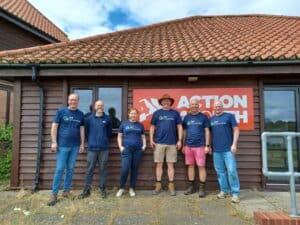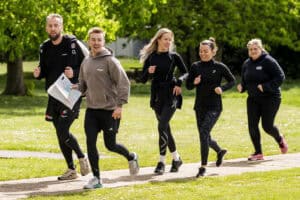
By the end of this year, schools will be required, by law, to meet the eight Gatsby Benchmarks, which include workplace experience and links to the curriculum. Here, Tracey McNicholas, head of Sixth Form at Aspire Alternative Provision, outlines her tips for helping schools to achieve the benchmarks by the end of 2020 and inspire students with meaningful career experiences.
Good career guidance is critical if young people are to raise to their aspirations and capitalise on the opportunities available to them. With young people needing to make decisions about their future careers earlier than ever before, good careers guidance is essential to support them with those difficult choices. Done well, careers guidance is a vehicle for social justice, enabling children from less privileged backgrounds to have access to the support more readily available to their peers and broadening their aspirations to careers and employment opportunities they hadn’t previously considered.
However, helping students gain real, practical experience in workplaces and linking it to the curriculum can be a huge challenge for schools. Costs and resources often compromise a school’s delivery of meaningful and enriching opportunities to help prepare students for life after school. Often, the job of securing this for children is handled internally by teachers, who take it on in addition to their already busy workloads. At Aspire Alternative Provision, we have been working with Action4Youth’s initiative, The Inspiration Programme (TIP), to provide our sixth form students with a well-rounded careers programme to help them thrive in their next steps after school.
This has resulted in a year-long enrichment programme which enhances young people’s opportunities, education and wellbeing. It has empowered our students to build their confidence, resilience, reflection, reasoning, critical thinking, collaboration and problem-solving skills so they can become work ready and prepared for the next stages of life. With direct access to employers and aligned to the Gatsby Benchmarks, we have been able to provide our students with real-life experiences outside the classroom in a number of ways, while engaging them in meaningful and enriching opportunities to help them prepare for life after school.
Getting hands-on
When it comes to learning about different career paths, nothing compares to hearing directly from real-life professionals. Having access to people in various fields means students can ask detailed questions about these careers, what the day-to-day work looks like, what they need to know, learn or have an interest in, and how they can take steps to get there. However, for many schools, establishing valuable links to professionals from a wide variety of sectors can be challenging.
Working with TIP and having assistance in unpacking a wide range of career opportunities, has been invaluable for our pupils. Visits, such as exploring food production from farm to table, have really broadened our students’ aspirations and encouraged them to consider further education and employment opportunities.
Broadening aspirations
Too often careers advice falls into the trap of only exploring a student’s strengths and weaknesses through a school-focused lens and aligning them to a suitable career option through personality and skill surveys. It is important to allow students to immerse themselves in different environments, gain first-hand experience and use this opportunity to gauge their interests, strengths and weaknesses. By taking this approach, they may find something which truly suits and engages them, including a sector or subject matter that they may have otherwise not considered, or previously discounted.
Implementing the Programme has provided a wide range of hands-on careers experience from the arts to environmental work and everything in between. This has given our students the chance to explore new options, and has encouraged them to self-determine their strengths, weaknesses and interests.
Leveraging personal interests
Through exploring their options for future careers, we find many of our students unlock new areas which really inspire them. Last year, one of our students developed a keen interest in psychology following a TIP session. By encouraging this interest, we were able to support them to gain the confidence to apply to university to study psychology and other higher-level apprenticeships. This was a path they had never considered before, let alone acted upon.
This is not an isolated story. So many of our pupils have been inspired by something as simple as a talk with a professional in a particular field. We find this is often the case with those from lower socio-economic backgrounds, who might never have had the opportunity to consider such a field.
Getting students out of their comfort zones
An initial concern with giving students so much space to explore their options and themselves was the pressure which this could place on some of our more vulnerable students, especially those who had struggled with their mental health. With sessions delivered in an unfamiliar environment, we wondered whether this could have a negative impact. However, we found the polar opposite to be true. Even with our most challenging students, who may not attend school regularly, we found there to be total commitment to each course in the programme. Sometimes we all need a push to achieve something, and with careers support this can make a huge difference to our future happiness.
With our other sixth form students, we have found that gently pushing their boundaries with this Programme has had an incredible impact on their behaviour and social skills. Exposing them to different sector experts has made them more adaptive to changing environments and improved their skills at meeting new people, all of which also help to prepare them for their chosen future careers.
Moving beyond the classroom
A good careers programme should not be limited to the walls of a classroom; it needs to be more dynamic and take leaning to new places as much as possible to truly inspire even the most challenging pupils. As part of TIP, our pupils have had incredible opportunities to take advantage of these new surroundings. Our classroom has been expanded by collaboration with a local college, which has also aided our students with their transition to the next phase of their education, whether it be academic or vocational.
Whilst controversial, as part of the Police and Criminal justice course, our students were able to visit a correctional facility and speak to those in prison about their lives, how they came to be in prison and the impact that this has had on their life and their families. This had a huge impact on all our students, not just those with challenging backgrounds, and has sparked a number of ongoing, in-depth conversations about mental wellbeing, sound decision making and acceptable behaviour.
One of the joys of working in education is the knowledge that your pupils may look back on their time with you, and at your school, and think that something you did made a difference to the rest of their life. Good careers guidance very much has the potential to positively shape our pupils’ futures, particularly for those who would otherwise have never had explored the options for their future in depth. By taking part in this Programme, we have been able to foster relationships between pupils and local businesses, giving our students the experiences to add to their CVs and take forward. For our most disadvantaged pupils, this has been a truly inspirational experience which will know is encouraging them to widen their horizons and aspirations.
Tracey McNicholas is the head of Sixth Form at Aspire Alternative Provision, which has been participating in Action4Youth’s The Inspiration Programme to ensure that young people receive well-rounded and supportive careers advice
Please help us make this page more visible by sharing it through your own social networks.






